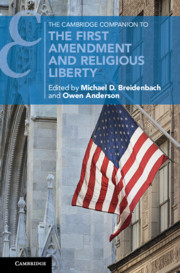Book contents
- The Cambridge Companion to the First Amendment and Religious Liberty
- Cambridge Companions to Law
- The Cambridge Companion to the First Amendment and Religious Liberty
- Copyright page
- Dedication
- Contents
- Notes on Contributors
- Acknowledgments
- Introduction
- Part I Philosophical Foundations
- Part II Historical Interpretations
- Part III Law, Politics, and Economics
- 9 Religious and Secular Presuppositions in First Amendment Interpretations
- 10 Two Concepts of Religious Liberty
- 11 The Economic Origins of Religious Liberty
- 12 Corporate Religious Liberty and the Culture Wars
- 13 Which Original Meaning of the Establishment Clause Is the Right One?
- 14 The Two Separations
- 15 The Challenge Ahead
- Index
9 - Religious and Secular Presuppositions in First Amendment Interpretations
from Part III - Law, Politics, and Economics
Published online by Cambridge University Press: 17 December 2019
- The Cambridge Companion to the First Amendment and Religious Liberty
- Cambridge Companions to Law
- The Cambridge Companion to the First Amendment and Religious Liberty
- Copyright page
- Dedication
- Contents
- Notes on Contributors
- Acknowledgments
- Introduction
- Part I Philosophical Foundations
- Part II Historical Interpretations
- Part III Law, Politics, and Economics
- 9 Religious and Secular Presuppositions in First Amendment Interpretations
- 10 Two Concepts of Religious Liberty
- 11 The Economic Origins of Religious Liberty
- 12 Corporate Religious Liberty and the Culture Wars
- 13 Which Original Meaning of the Establishment Clause Is the Right One?
- 14 The Two Separations
- 15 The Challenge Ahead
- Index
Summary
The sixteen words on religion in the First Amendment have generated voluminous and vociferous scholarly interpretations. These controversies strike at the heart of the role of religion in American public life. How are we to decide which interpretation of the First Amendment is correct? Answers to this question have been laden with presuppositions. This chapter is an interdisciplinary analysis of recent historical, political, legal, and philosophical writing on the First Amendment to illustrate how key presuppositions inform the approach to arguments about the meaning, scope, and intent of the First Amendment. The chapter will first outline the contextual and philosophical problems of interpreting the First Amendment. It will then evaluate the providentialist, secular, and pragmatic presuppositions that have guided scholarly interpretations. Ultimately, the chapter will argue that there has not been a single understanding of the relationship between church and state in America, but that investigating these presuppositions can help us better appreciate the dynamic nature of religion, politics, and jurisprudence in America.
Keywords
- Type
- Chapter
- Information
- Publisher: Cambridge University PressPrint publication year: 2020

